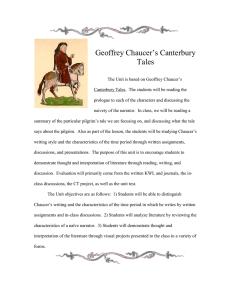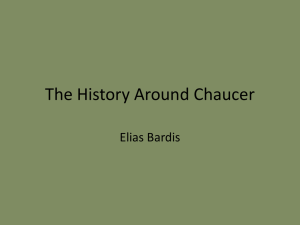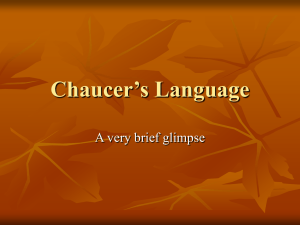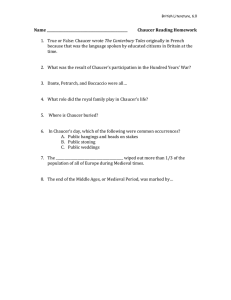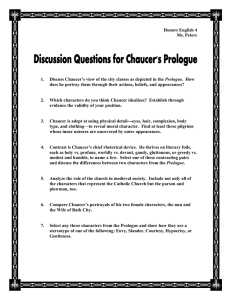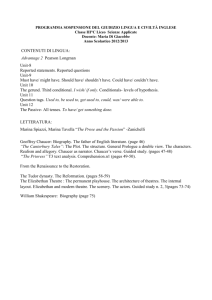Liar's Tale
advertisement
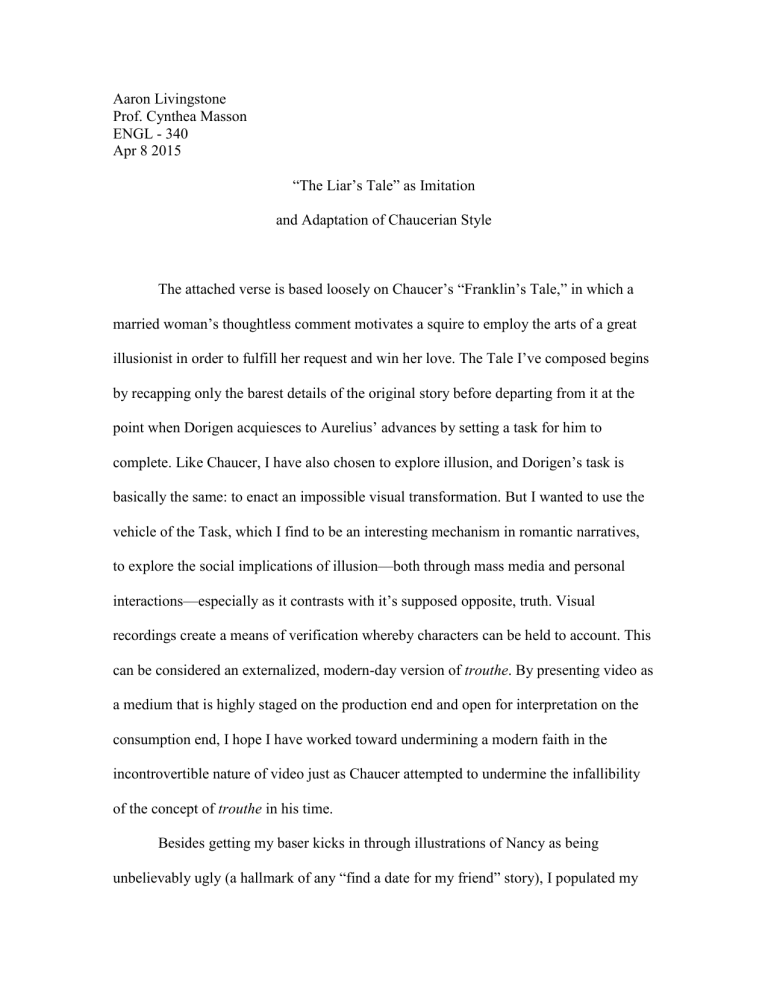
Aaron Livingstone Prof. Cynthea Masson ENGL - 340 Apr 8 2015 “The Liar’s Tale” as Imitation and Adaptation of Chaucerian Style The attached verse is based loosely on Chaucer’s “Franklin’s Tale,” in which a married woman’s thoughtless comment motivates a squire to employ the arts of a great illusionist in order to fulfill her request and win her love. The Tale I’ve composed begins by recapping only the barest details of the original story before departing from it at the point when Dorigen acquiesces to Aurelius’ advances by setting a task for him to complete. Like Chaucer, I have also chosen to explore illusion, and Dorigen’s task is basically the same: to enact an impossible visual transformation. But I wanted to use the vehicle of the Task, which I find to be an interesting mechanism in romantic narratives, to explore the social implications of illusion—both through mass media and personal interactions—especially as it contrasts with it’s supposed opposite, truth. Visual recordings create a means of verification whereby characters can be held to account. This can be considered an externalized, modern-day version of trouthe. By presenting video as a medium that is highly staged on the production end and open for interpretation on the consumption end, I hope I have worked toward undermining a modern faith in the incontrovertible nature of video just as Chaucer attempted to undermine the infallibility of the concept of trouthe in his time. Besides getting my baser kicks in through illustrations of Nancy as being unbelievably ugly (a hallmark of any “find a date for my friend” story), I populated my Tale with shallow, self-involved people because, besides the greater potential for lampooning, I wanted to maximize the distance between their trouthe and what the reader interprets as the Truth. Averagus, like many reality TV stars, has washed out of his former career and is desperate to sell the one thing that remains to him, his image. Aurelius is eager to cast himself in the light of longsuffering lover, but he exaggerates his efforts to fulfill Dorigen’s request and is quick to take credit for the work of the Too Live Crew (an homage to modern rhyme-smiths, although they are East Coasters) in Nancy’s transformation. He interprets his emotional pain as effort that should be rewarded by Dorigen. For her part, my Dorigen is the polar opposite of Chaucer’s, who saw her word as an inexorable bond, and trusted Aurelius’ word implicitly, without verification. In my tale her request of and reward for Aurelius is more plainly stated (although still ambivalent), and she is given video documentation of the task completed. However, her trouthe is ultimately shown to be contingent upon her own biases and faulty memory. She is not lying when she disavows knowledge of their transaction: she is demonstrating the imperfection of the human mind and the freedom that comes with forgetting. The end of my tale devolves into two people bandying trouthes back and forth, showing the futility of words, and suggests that truth can only exist in solitary silence. Much of the concrete detail of Chaucer’s “Franklin’s Tale” is left by the wayside in this modern retelling, but the spirit of social commentary remains strong, and the driving force of that commentary is humour. Averagus’ hyperbolic decline from honoured knight to travelling salesman to sleazy reality TV star portrays a larger-than-life scenario of the fallout from a desperate but misdirected search for forms of social repute, from martial skill, to money, to naked, baseless fame. His loss of status is precipitated by the same disregard for honour and honesty that Dorigen displays when she manipulates the people around her for a lark. The play of displacement between intent and spoken word is manifested through Nancy’s transformation by the Too Live Crew, which stands as a fairly overt representation of what society, in its lowest common form, wants to be shown on TV or in our personal relationships. We demand beauty, as well as simple and unambivalent meaning, and I attempt to satirize these values through the superficiality and temporary nature of Too Live Crew’s work. I have tried to further undermine the value of truth (as simplicity/directness) by inserting as much confusions and equivocation as my limited experience with verse allows. Averagus’ “Knightly exploits” and Aurelius’ mistake concerning who Dorigen’s “man” is are examples of these, and I hint at my intention in the opening stanza (“Liar’s Tale” 20, 224). I hope I have preserved what is best about Chaucer’s work—namely that it has the power to hurl serious accusations at its audience as they enjoy a hearty chuckle—while employing it within the proper setting, that being the present moment with all its perennial hypocrisy. Annotated Bibliography Schofield, William Henry. “Chaucer's Franklin's Tales.” MLA of America. 16.3 (1901): 405449. Hathi Trust. Web. Mar 20 2015. “Here, then, we have the picture of a supremely happy marriage, a portrayal of the ideal relations between man and wife” (408). My initial research took me to Schofield, whose turn-of-the-century article interprets the dealings between the characters as innocent, well meaning, and resultant from their deeply ingrained sense of honour. His interpretation contrasts sharply with the direction of our class discussion, in which it was generally agreed that honour is evoked simply as a veil for self-interest by all parties concerned. This contrast allowed me to position these interpretations upon a spectrum of possible responses to the text that was much wider than I originally supposed. A greater range of possibilities gave me greater creative license to develop my own response to the “Franklin’s Tale.” Dean, James. “Spiritual Allegory and Chaucer's Narrative Style: Three Test Cases.” The Chaucer Review 18.4 (1984): 273-287. JSTOR. Web. Mar 23 2015. “Chaucer suggests an allegorical dimension to certain situations and asks us, as listeners or readers, to reach our own conclusions” (274). Dean explores Chaucer’s deftness of allegorical signification. He notes a degree of complexity in Chaucer’s use of allegory that sets him apart from contemporary writers. By remaining uncommitted to the spiritual allegory, Chaucer’s characters “shade into” and out of a mode that points to alternate readings without fully engaging in moralistic didactism (274). I took this as a cue to not feel constrained by my analogies but rather to embrace the polysemous images, such as Los Angeles or Nancy’s make-over, that arose during composition. I wanted the audience experience to be both “clear” and “muddled” to allow for the widest interpretation (“Liar’s Tale” 7,8). Mann, Lindsay A. “‘Gentilesse’ and the Franklin’s Tale.” Studies in Philology 63.1 (1966): 10– 29. JSTOR. Web. Mar 23 2015. “‘gentilesse’ or ‘courtoisie’ … : originally terms used to designate the noble social class, the words had definite moral significance as well” (11). Mann’s explication of the term gentilesse is what first inspired me to play with media and objective truth in my retelling. “[S]ocial and political organization rested largely upon oaths” in Chaucer’s era, while today written contractual agreements and media recordings are the adhesives that bind us to our “word” (13). By placing the characters of the “Franklin’s Tale” in a world where words count for very little, I could tell a story of the degradation of the original social hierarchies that were the denotative origins of the word gentilesse. Duffell, Martin J. “Chaucer's Pentameter: Linguistics, Statistics, and History.” The Chaucer Review 49.2 (2014): 135-60. Project MUSE. Mar 23 2015. This article provides a meticulous overview of the division between linguistic and literary scholarship regarding Chaucer, and makes overtures toward reconciliation. To that end, Duffell’s statistical approach to Chaucer’s “verse design” shows influence from the French “vers de dix,” and the Italian “endecasillabo,” and then draws connections between borrowed formalisms and their content (136, 148, 152). Chaucer made use of either form if it suited him, but the nascent English iambic pentameter seems to have been formed as much by the exigencies of rhyme and rhythm as by formal rules of verse. This was comforting to me as I embarked on a lengthy tale in verse form. While I was less successful than Chaucer at consistency of stress placement, I gave myself license to be freer with meter than he was, as I wanted the meter to be a reflection of the characters themselves. The Roommate’s advice to Aurelius, set roughly to the form of “Rapper’s Delight” (The Sugarhill Gang, 1979) is the most obvious departure from Iambic pentameter, but stanzas concerning Averagus move away from pentameter as well, to a four-stress, limerick style of verse intended to portray him as an object of ridicule. Crepin, Andre. “Chaucer's Subtil Engyn.” Etudes Anglaises: Grande-Bretagne, Etats-Unis 56.4 (2003): 403. Cairn.Info. Web. Mar 23 2015. “So subtle is Chaucer’s wit, it is virtually impossible to reach a clear-cut conclusion” (410). Crepin’s survey of the endless variety of Chaucer’s voices, styles, and messages is itself frenetically multi-directional. By naming art as the “chaff” and meaning as the “fruit,” Crepin seemingly positions himself as one of the critics he warns against: those who would glut themselves upon (juicy?) deconstructions and re-interpretations of the text at the expense of simple appreciation (403, 410). But his own expertise and appreciation of Chaucer are so apparent that they belie any suggestion of obsession toward meaning. Crepin’s attitude—of comfort with many simultaneous understandings of a single text—is one I aspired to. My Tale does not allow the freedom of interpretation I would have liked it too when I began writing it, but I’ll chalk that up to beginner’s status. I nonetheless believe I’ve succeeded in preserving the most important quality of Chaucer’s work, which is his ability to speak intelligently to the diversity of human nature, no matter the era. The Liar’s Tale: A Modern Reimagining of “The Franklin’s Tale” by Geoffrey Chaucer “There can exist no happiness, no gladness, no hope, no pride, no real present, without forgetfulness” (Friedrich Nietzsche, The Geneology of Morals) Many a worthy poet has there been, Who could tell it more or less how it is seen, In words that hit the nail upon the head, And pass the message on, without a dread. Allas, but I, unfortunate to say, Am not of those who's words-work seems as play, The effort shows as clearly in these lines, As muddled be the message often times. 10 20 30 Nevertheless I'll endeavour here to tell Of what has, erstwhile, to our friends befell, Since before I end my frank, linear verse, Whatever's from the beginning that's of worth, Should be honestly and forthrightly conveyed, Lest verisimilitude be betrayed. So let us turn our eyes to Dorigen, And what a sight she is, a happy blend Of beauty, and of honesty to boot, For both are one, and other traits are moot. Such bliss there was 'tween her and Averagus, His knightly exploits prove he is courageous, And all the land will swear to their virtue, Since they themselves display it to through and through. But lo, Aurelius has come, aflame, Desire unslaked, his restless heart untamed, His hope, through dance or by some trickery, Dorigen's love to master, greedily. So when she shirks him, faithful to her knight Aurelius hides his anger and his spite Beneath a mask of sadness, feigning tears, Soliciting Dorigen's pity and her fears That someone might be watching secretly, And rumours might pervade society. She spares Aurelius the hardened truth, Preferring kindly lies to the uncouth. Should he fulfill a requisite condition And prove himself a passable magician, She will perhaps her feelings reconsider And to Aurelius be not so bitter. 40 50 60 “I have a friend” quoath she, “whose face is known, Through all the land, the talk of it has flown, Her beauty knows no depth, because of course, Its buried deep: she looks just like a horse. Her face is as a graveyard cast in night Her features like the dead that sit upright. Her nose, unfortunate encumbrance, Makes one think of mole rats locked in dance. Her ears are saggy, sickly, mottled things, With fearful resemblance to vultures' wings. Worst of all by far must be her eyes To look into them I simply surmise Comp'rable to them only are the rocks That terrorize the British ships at docks. “Despite her odious complecti-on, And diabetic predilecti-on And womanly figure that without doubt is gone, And horrific obesity beyond, Her friendship that I cherish, sir, for sooth Impels me to constrain you with this truth: For of sweet love you surely shall taste none, Unless you also find my friend someone.” The ugly truth thus to the squire imparted, He has from her fine company departed, To think upon her lovely spectacle, And fret about unsightly obstacles. One thought, in time, soon dominates the other, And grief eclipses she, his would-be lover. 70 Hopeless as he was to ever win her, He just sat around the house, and ate Kraft Dinner. Each day he sunk into a deeper woe, Till' at last his roommate said, “look, yo- “If this bird you like Is worth half the hype, And if what you say is true I think I know the type, Just play it hella cool Bring out some fresh new moves Ya shit is bummin' me out ya'll gotta change the tune 80 90 “Now what you gonna do next Ya get onboard a jet, You just fly ya ass down to LAX Step off the plane Yo ass is gonna be slayn With all that tasty trim ain't no way to complain. Look around you dog, there ain’t a dog in sight Sunny La La Land be doin' somethin' right: Right? “Now my LA friends they be some powerful folk, They know some powerful magic, shit ain't no joke. They'll take a nasty-ass dame and pretty her up nice, Have 'er ready fo' the cam-ra in like half a trice. Now you know what’s comin' 'cause there's a catch you see, They gonna wanna put 'er ass on MTV Or like Slice 'a Life or some stupid shit so just be prepared when ya hit with it. “I love you dog, I hate to see you in pain I hope ya take my advice and get on that plane.” 100 Aurelius pondered his friend's sage advice And decided that a trip would be quite nice And if the power to change Dorigen's chum Might be found in Los Angeles' slums, Then that’s his destination, sure and true, To beg help from a television crew. Meanwhile, taking his own fate in hand, Averagus the knight travels across the land. He bids “fair thee well” to his devoted maiden, His suitcase with possessions heavily laden. What he hasn't told Dorry is he's lost all their money By sucking so bad in a duel it was funny. First he couldn't get his armour on right, his helmet came off mid way through the fight, 120 130 Next was his jousting, less than lackluster, Opponents' thrusts slipped right past his buckler He stabbed his own horse in the rump by mistake Then he lay in a heap his own death trying to fake. The long and the short of his swordplay is this, That all their life savings away have been pissed. So now he will ramble from city to city, A travelling salesman's life, such a pity; A knight in name only, and awfully lonely, Their fortune he'll try to win back very slowly. First stop on his voyage? Why the land of commerce, To So.Cal. He'll go, he could do much worse, Than sunny L.A. where people like him, Can make due with good looks, with a smile, and some sin. As Averagus winds down Oregon's Coast, Modest headway Aurelius can boast; For though no prettier than when he met her, Dorigen's chum was also quite unfettered, So off she went with him to California To seek bea-u-ties elusive formula. 140 150 This friend, who Nancy we will call, Since “Nancy” rhymes with “fancy” after all, And if you saw her walking down the street, You'd fancy that the plague had found some feet. Anyways, Dear Nancy trudged along, Receiving glances cast her way side-long, But Aurelius seeks out a neon sign, The object of his quest he is consigned. He spies it in the offing, they approach The sign it reads “Too Live” upon a post. When entered, they, the temple of TV Functionaries greeted, hastily, “Welcome to Too Live, how do you do? Come see the magic of the Too Live Crew!” And beckoned them into the dressing room, Where opulent clothing lavishly festooned, The walls, the drawers, the closets, and the floors. Up to her ample waist was Nancy swimming, In lacy dresses, all of them quite slimming. She'd barely time to choose a nice moo-moo, When shoved she was into another room… 160 170 180 190 Where caricatures of beauty huddled round, With not a blemish or a wrinkle found. To Nancy's humble face was applied So much blush you couldn't recognize A single feature of her grizzled face. Then off she's shuffled to another place. “Here,” they said, “we'll fix all of your flaws, And you will prance around to great applause. The normal life you lead is fine enough, But TV's audiences are more tough. They demand perfection plain and simple, You can't afford a solitary pimple. They don't want to see you hoard a bunch of crap, Or rush, or stress, or suffer from a lack. So to that end, your house is renovated” (and hearing this, Nancy looks quite elated) “But that’s not all, you're now a buddhist, too, You're into yoga, you're great at “Name-That-Tune” You're thoughtful, positive, intelligent, You say the thing that everybody meant, Your winning personality is sure To win the heart and mind of every viewer.” And when the Too Live Crew were done their work, An ignoble past is what Nancy had shirked. So when Aurelius in turn descried Her fancy dress, her poise, her brand new guise, His heart leapt up, so confident was he, That he could find a date for fair Nancy. “But wait, no need,” spoke up the Too Live Crew, We'll do that for you on our 'Really Big Show'. The dating scene is what this show reveals, And Nancy's look will certainly appeal To the bachelor who's just signed on with us, The honourable and timely Averagus. “Cripes!” Aury yelled then dove 'neath a curtain, As Averagus stepped toward Nancy quite certain That here was a dame Worthy of his new fame, 200 That reality TV would surely proclaim. Nancy, abandoned, Stared out with a hand on Her head so surprised at all the attention. Dear listener, Aurelius could not but look on, As the love of his love loved another anon. They talked and they laughed, sharing secret delight, While the cameras rolled on, recording the night… 210 220 230 The L.A. sun rose on a brand new day, As Aurelius once more debarked by plane Feeling inspired by his accomplishments, With proof in his bags of the achievement That garnered would the love he’d long sought That with such effort and with pain he'd bought. No time was spared in reaching Dorigen To confront her with the promise she'd given Him to switch her mood around 180, And to him act a bit more like a lady. At first she'd not believe his evil words, Protesting even as Aurelius turned The recording of the knight in question on To show the things he did while he was gone. She watched, transfixed by horror at the deed; It was too live, too blatant not to heed The clear message that it certainly entailed, So Aury was confused when Dorry wailed, “My Man, My man! What have you done to me?” He replied “not to but done for thee!” “I've fulfilled my end of our agreement, And found your friend a date for your appeasement Nancy looks as happy as can be, So now I wish you'd give favours to me…” “I'm certain I don't have a single clue” Said Dorigen, “whom you were speaking to” But I made no such promise, by my trouthe, And pitiful Nancy, whose face is surely not To be found on TV, where only beauty lives, So is absent from the proof you give.” “No! By my trouthe! She's there! Look!” 240 250 Aurelius pointed at her as he shook With rage at Dorigen's stubborn denial: His own reality was put on trial. “I've spent my days in anguish, nights in pain, In constant struggle for your love to gain, And now you see the proof before your eyes You deny ever making verbal ties The very thing that as wise Nietzsche said Exalts us from the birds and beasts, instead Your words are flighty, light and effervescent Blown away or frightened like a pheasant!” “Nay” replied Dorigen to he, “By my trouthe, that woman is not she, Furthermore, and this my final word, Seeing as your case is quite absurd, I made no promise of my body or My mind to you or any man before. Both are free from obligation since You've shown me Averagus' av'rice.” With that, she sauntered off, quite blissfully Aware of only present sensory Perception un-impinged by destiny Or wrongs thus passed and gone from memory. 260 Averagus won't for some time know That Nancy's looks are products of the show… That TV's power is often overblown… That the make-up, clothes and jewelry were loans… Aurelius stands alone and dumbfounded Empty hands upturned, his mind enshrouded By a statement to himself expounded: “Whatever trouthe is, well, by God, I've found it.”
